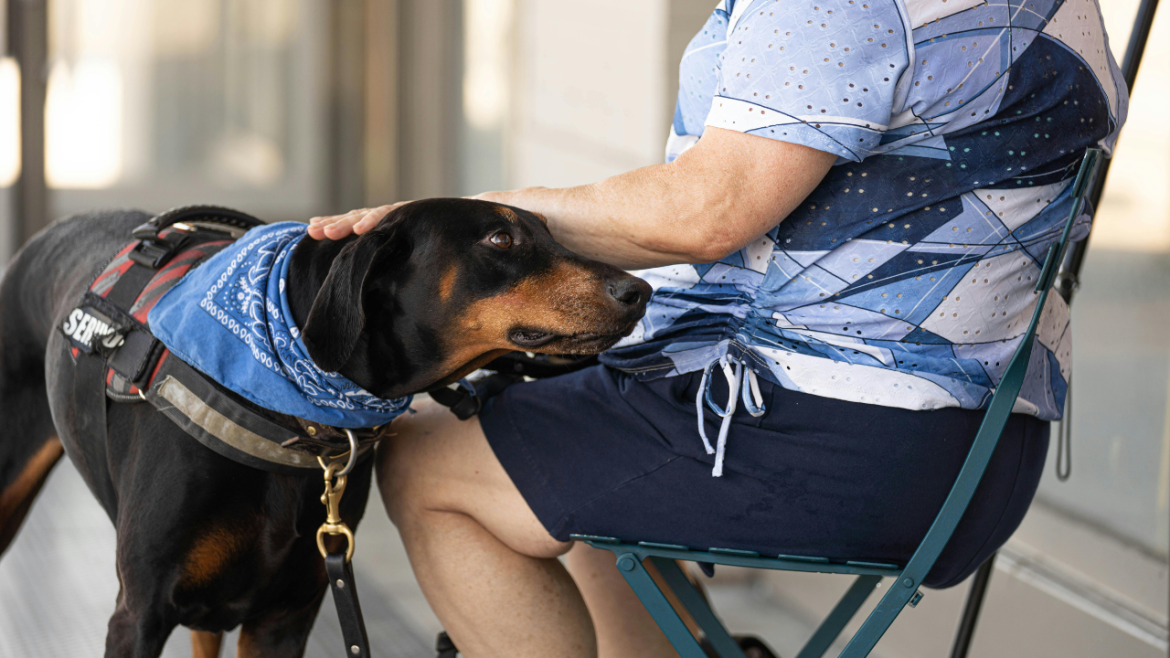How Pet Therapy Can Help A Senior With Dementia
Did you know that Leading Edge Senior Care has a Dementia Support Group? We meet monthly in Mesa. For more details <click here>
How Pet Therapy Can Help A Senior With Dementia
Dementia is a debilitating condition that impacts not just memory but a person’s overall well-being. As this condition progresses, seniors can feel isolated, anxious, and confused. However, one therapeutic approach that has gained recognition in recent years is pet therapy. This innovative treatment focuses on using animals to comfort, engage, and uplift seniors suffering from dementia.
Pet therapy, also known as animal-assisted therapy, offers various emotional and cognitive benefits. It can help alleviate anxiety, encourage social interaction, and reduce feelings of loneliness. By understanding the positive effects of pet therapy, caregivers can improve the quality of life for seniors with dementia.
The Emotional Impact of Pet Therapy
One of the most challenging aspects of dementia is how it affects emotional health. Seniors with dementia may experience mood swings, depression, and confusion. These emotions often make it hard for them to connect with others, leading to a sense of isolation. Pet therapy helps to break this cycle.
When seniors interact with animals, they can experience comfort and joy. Pets offer unconditional love and companionship, which helps to stabilize the emotional state of seniors with dementia. For example, stroking a dog or cat can lower stress levels by releasing oxytocin, a hormone that promotes bonding and reduces anxiety.
Moreover, pets do not judge. Unlike human interaction, which can sometimes be overwhelming or frustrating for dementia patients, animals offer a simpler, calmer form of companionship. This can help ease feelings of frustration and emotional detachment, making seniors feel less anxious and more connected.
Encouraging Social Interaction
As dementia progresses, it becomes harder for seniors to maintain social connections. They may withdraw from conversations, feel disoriented, or even have trouble recognizing loved ones. Pet therapy offers an alternative way to engage seniors who may not respond to traditional social activities.
Interacting with a therapy animal often stimulates conversation, both between the senior and the pet, and with caregivers or family members. For example, watching a dog perform tricks or simply observing the animal’s behavior can spark memories and provide topics for conversation. Seniors who might otherwise stay silent can begin to talk about past pets or other memories associated with animals.
This type of interaction fosters a sense of inclusion, helping seniors feel valued and understood. Additionally, caregivers can use pets as tools to engage seniors in group activities, promoting a greater sense of community.
Reducing Agitation and Behavioral Symptoms
Seniors with dementia often experience behavioral challenges such as agitation, aggression, or wandering. These symptoms can make caregiving particularly difficult, as the senior may become restless or confused, especially in the late afternoon or evening, a phenomenon known as “sundowning.”
Pet therapy can help calm these behaviors. The presence of an animal provides a comforting distraction, helping to divert attention away from stressors. For example, a therapy dog can offer soothing companionship, encouraging a senior to focus on petting the dog rather than feeling agitated. The rhythmic motion of petting also has a calming effect, helping to reduce restlessness and aggressive behaviors.
Additionally, the structured routine of caring for or interacting with a pet can help seniors feel more grounded. Routine is critical for individuals with dementia, as it offers predictability in a world that can feel confusing. Incorporating regular pet therapy sessions can become part of the senior’s daily or weekly schedule, further reducing anxiety.
Cognitive Stimulation Through Pet Interaction
Dementia not only impacts memory but also cognitive function. Over time, seniors may struggle to complete simple tasks, process information, or make decisions. Pet therapy can stimulate cognitive function in subtle ways.
For example, interacting with a dog or cat encourages seniors to focus on the here and now. Whether they are brushing the animal’s fur or giving it commands, they are engaging their brains in a purposeful way. Simple activities like feeding the pet or throwing a ball also promote motor skills and coordination, which are often impaired by dementia.
Moreover, pets can offer sensory stimulation, which is vital for cognitive health. The texture of a dog’s fur, the sound of a cat’s purr, or even the sight of a fish swimming can trigger memories and enhance cognitive function. By engaging multiple senses, pet therapy helps to keep the brain active.
Enhancing Overall Well-Being
Ultimately, pet therapy is about enhancing the overall well-being of seniors with dementia. While it cannot reverse the effects of dementia, it offers a way to manage symptoms, improve mood, and bring joy to those who are struggling.
Families and caregivers who integrate pet therapy into a senior’s care plan often find it to be one of the most rewarding experiences. It provides a sense of purpose and companionship that is invaluable to those battling the challenges of dementia.
In conclusion, pet therapy offers numerous emotional, social, and cognitive benefits for seniors with dementia. By providing companionship, reducing agitation, and stimulating cognitive function, therapy animals can improve the quality of life for those affected by this condition. For caregivers, understanding the value of pet therapy can open the door to more compassionate and effective care strategies.

